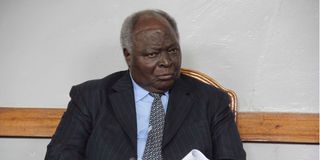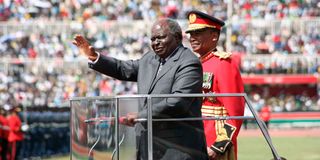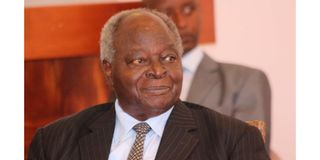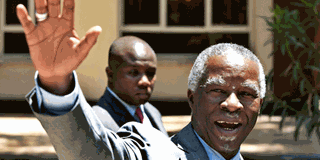
Former President Mwai Kibaki.
The world is changing, violently and unpredictably. To face the emerging horror of violent intervention in Africa by proxies of big and medium global powers as in Sudan, and the tumult in global markets emanating from Donald Trump’s America, we might learn something from past leaders who served us well.
There is a 1970s black-and-white video-clip doing the rounds on the internet of the then Kenya minister for Finance and Planning, Mwai Kibaki. In it he explains why the government had decided to educate Kenyans on the vital nature of family planning.
In clear and eloquent language, he states that the idea is to provide parents with the knowledge that will enable them plan for a family size that meets household resource capabilities and needs, in the same way that farmers are instructed on the combination of inputs, farming gear and seeds that will give them the best net returns.
The idea here is that development is largely a matter of providing human beings with knowledge and capabilities to judge independently the best way to lead flourishing lives, was to be formally presented by Nobel economist Amartya Sen when he defined “development as freedom” in 1999.

Former President Mwai Kibaki and Chief of General Staff Jeremiah Kianga during the 48th Madaraka Day.
Such is what one expected given the intellectual calibre of Mwai Kibaki, having taken a first class honours degree in economics and politics in 1955 from the University of London (which then set the curriculum and examined the degrees at Makerere University in Uganda) followed by a postgraduate Bachelor of Science degree in Public Finance at the London School of Economics.
As Finance minister (1970-88), he spoke to his budget statement in Parliament, never reading it verbatim. In his later years he was to be awarded belated honorary degrees by Makerere, University of Nairobi, Kenyatta and Kimathi universities. Yet in country like ours where lucklustre achievers insist on so many honorifc titles (like Hon, CPA, Rev, Dr) and post-nominal letters (PhD, VC,DSO) that it is at times hard to find the owner’s name, Kibaki never once insisted that he be called “Doctor”. (Neither did Tom Mboya, Jomo Kenyatta or Daniel arap Moi for that matter). And he declined to have Thika Superhighway or any building named for him. This was humility in action, and with it came the virtues of personal integrity and compassion.
Virtue
That combination of intellect and virtue is something Kenya and Africa now desperately need. In the words of Nelson Mandela, “A good head and a good heart are always a formidable combination” in a leader. Compared to his contemporaries, Mwai Kibaki comes as closer to that ideal than most. This judgement, however, must be tempered by memories of the 2007/2008 post-election violence and the Anglo-Leasing corruption scandal, for as the great American novelist F.Scott Fitzgerald wrote, “Give me a hero, and I will write you a tragedy”.
Kibaki himself attributed character to the wisdom received from the elders and to his teachers. Anyone who listened to his many off-the-cuff remarks will recall him quoting Father John J. O’Meara, on the primacy of virtue and high standards in public service. An Irishman of the Spiritans Order, and a disciplinarian with firm belief in quality education with Christian values, O’Meara was principal of Mangu High School when Kibaki was a student there (1951-54). His impact on character is mentioned by ex-Vice President Moody Awori, Tom Mboya, Lawrence Sagini, Sam Waruhiu, Father John Njenga, and others.
Many speakers in this year’s Mwai Kibaki memorial lecture recalled the former president’s role in restoring widely-shared economic growth under the National Rainbow Coalition (Narc) administration that was installed in 2003. It is a subject that was addressed with authority by Prof Peter Anyang’ Nyong’o, the president’s right-hand man in mapping out economic recovery strategy, launching the National Economic and Social Council and the Kenya Vision 2030, now all but forgotten.

Former President Mwai Kibaki on May 18, 2018. He died on April 21, 2022.
Gross Domestic Product (GDP) growth rose from 0.6 per cent in 2002 to 7 per cent in 2007. I must add that under his direction, GDP grew by an annual average of 7 per cent from 1964 and 1974 with minimal debt and minimal external aid.
as now, Kenya faced existential threats — Soviet military jets in Somalia and Uganda that could have flattened Nairobi in minutes, the 1974 oil crisis, rising unemployment and so on — but Kenyan leaders found solutions that avoided the worst. In July1974, Time magazine nominated Mwai Kibaki among 100 leaders likely to shape global affairs in future. In1978 he wisely turned down the offer to become a World Bank vice president.

Former South African president Thabo Mbeki.
In a widely-reported speech two weeks ago, former South Africa president Thabo Mbeki deplored what he called “the decline in the quality of political leadership in Africa”. He was right. But as the June 2024 Gen-Z protests reminded us, let us look closer to ourselves for inspiration and solutions.
Prof Michael Chege spoke on leadership at the Second Mwai Kibaki Memorial Lecture, on April 11, in Nairobi. He is a research affiliate of the Institute of Development Studies, University of Nairobi.






